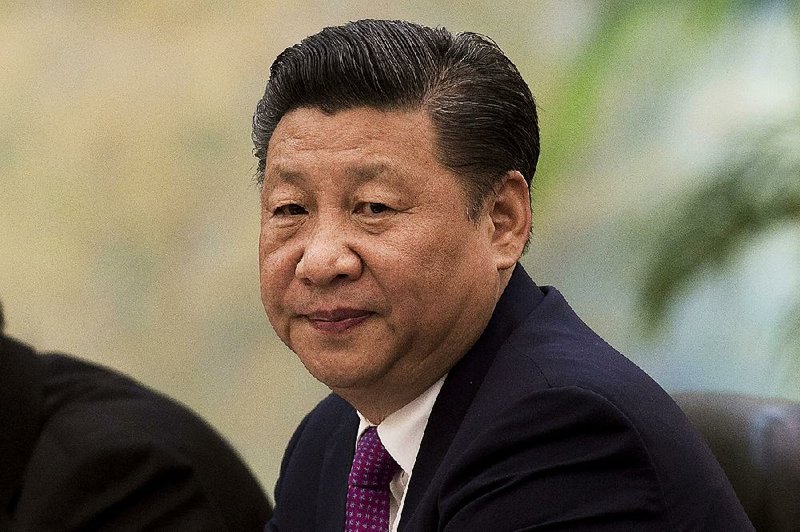BEIJING -- The White House is ratcheting up the urgency over North Korea's nuclear pursuit ahead of President Donald Trump and President Xi Jinping's first meeting, with a senior U.S. official warning that the "clock has now run out" on North Korea.
Trump and Xi will huddle Thursday and Friday at Trump's Mar-a-Lago estate in Florida, a venue chosen to give the summit a more informal feel. White House officials said Tuesday that trade and security would be high on Trump's agenda, including pushing China to exert more economic pressure on North Korea.
Speaking at a White House business forum Tuesday, Trump called North Korea a "humanity problem." A White House official later said time has run out and "all options are on the table" for the U.S., though the official would not say what steps Trump was willing to take to curb Pyongyang's pursuit of a nuclear weapon.
North Korea fired a ballistic missile into the waters off its east coast today, U.S. and South Korean officials said, in a reminder of the simmering tensions on the Korean Peninsula.
[PRESIDENT TRUMP: Timeline, appointments, executive orders + guide to actions in first 100 days]
The U.S. Pacific Command said it detected and tracked what it assessed as a North Korean missile launched from land near the eastern city of Sinpo. A U.S. statement said initial assessments indicate the type of missile was a KN-15 medium-range ballistic missile. South Korea's Joint Chiefs of Staff issued a similar assessment, saying the missile flew about 37 miles.
China continues to oppose the tough measures demanded of it to address North Korea, fearing a collapse of the Pyongyang regime would lead to a crush of refugees and possibly U.S. and South Korean troops on its border.
Trump told the Financial Times newspaper that the U.S. is prepared to act alone if China does not take a tougher stand against North Korea's nuclear program.
"China has great influence over North Korea," Trump said. "And China will either decide to help us with North Korea, or they won't. And if they do that will be very good for China, and if they don't it won't be good for anyone."
China has remained largely sanguine ahead of the summit, with Vice Foreign Minister Zheng Zeguang telling reporters that "both sides look forward to a successful meeting so that a correct direction can be set for the growth of bilateral relations."
Like many nations, China is still grappling with Trump's mercurial nature after the relative transparency and predictability of the bilateral relationship under Trump's predecessor, Barack Obama. Both during his campaign and after his victory, Trump complained repeatedly over China's allegedly unfair trade practices, its perceived lack of assistance in reining in North Korea's nuclear ambitions and its drive to cement control over the South China Sea.
Some analysts believe Xi might be willing to hand Trump a symbolic victory on trade to put a positive spin on the meeting.
"Xi probably can't accommodate Trump on sovereignty and security issues, but he has a lot of leeway on economics," said Robert Sutter, a China expert at George Washington University in Washington, D.C.
Yet even if Xi is able to offer Trump deliverables, he will still have to deal with "a restless U.S. president valuing unpredictability and seeking advantage for his agenda going forward," Sutter said.
Trump was seen as moving trade even more to the forefront when he signed a pair of executive orders Friday focused on reducing the trade deficit. Coupled together, the orders appeared to be a symbolic shot at China, which accounted for the vast bulk -- $347 billion -- of last year's $502 billion trade deficit.
While aides insisted the timing was coincidental, the administration touted the moves as evidence of it taking an aggressive but analytical approach to closing a trade gap that is largely due to the influx of goods from China.
Still, Trump told the Financial Times that during his meeting with Xi, he doesn't "want to talk about tariffs yet, perhaps the next time we meet."
Responding to Trump's tweet about the trade deficit, the Foreign Ministry's Zheng portrayed the matter as one in which the two countries had an equal stake.
"China will continue to work with the United States to think creatively and keeping pushing for greater balance in China-U.S. trade," Zheng said.
Information for this article was contributed by Vivian Salama and Hyung-jin Kim of The Associated Press.
A Section on 04/05/2017

